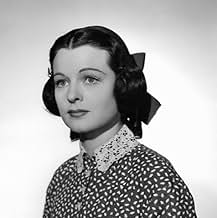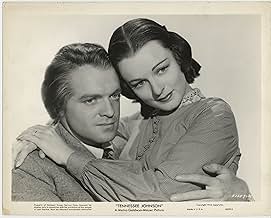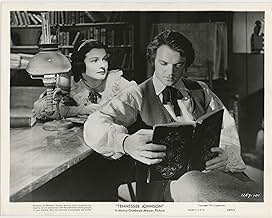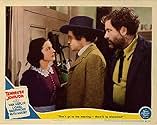Füge eine Handlung in deiner Sprache hinzuBiography of Andrew Johnson, who followed Abraham Lincoln into office and became the first President of the United States ever to be impeached.Biography of Andrew Johnson, who followed Abraham Lincoln into office and became the first President of the United States ever to be impeached.Biography of Andrew Johnson, who followed Abraham Lincoln into office and became the first President of the United States ever to be impeached.
- Sheriff Cass
- (as Noah Beery Sr.)
Empfohlene Bewertungen
"Robert Maxwell" wrote> It's generally agreed that at the second inauguration, Andrew Johnson was skunk drunk when he took the oath and tried to make his speech. I just watched the movie, "Tennessee Johnson," and it appears that Johnson was ill during the inauguration and that Lincoln later sent him a letter saying something like, "If you took a drink more often, you would know better than to take brandy on an empty stomach because you are ill. I know you only were there because I asked you to be."
Does anyone know if this letter ever existed?
Reply. "Having worked for three years as an assistant editor with The Papers of Andrew Johnson and as a member of the Board of Directors of the Abraham Lincoln Association, which is engaged in supporting projects to edit the papers of the sixteenth president, I can safely say that no one I know has ever claimed such a letter to exist."
Anyone interested in the impeachment of Johnson might watch the first 20 minutes of Blight's lecture on the subject, on open courses from Yale. Don't be intimidated by "college" or "Yale". (I went there and it's not that demanding.) Blight gives an informative, objective, and lively presentation of the material -- interrupted briefly by somebody yelling "Let my people go," to which Blight replies, "You're free to leave...I hope that guy doesn't have a gun."
http://academic earth.org/lectures/black-reconstruction-economics-of-land-and-labor
Please eliminate the space between "academic" and "earth". It's only there because IMDb.com doesn't allow words that are too long, like floccinaucinihilipilification.
There, we meet film subject Van Heflin (as Andrew "Andy" Johnson), in a leg iron. The future President is a runaway apprentice (between free-man and slave, but significantly closer to free). Bound to a tailor, Mr. Heflin has learned the profession and goes about mending figurative fences with local townsfolk. He learns to read and write from attractive Ruth Hussey (as Eliza McCardle), who becomes Heflin's first lady. Reading "The Bill of Rights" gets Heflin interested in expanding US Constitutional rights to include non-property owning "white trash" like himself...
Becoming successful in politics, Heflin's Johnson goes against the Southern grain by supporting some of Abraham Lincoln's platform; they both want to keep the Union whole. After the Civil War, President Lincoln selects Johnson as his Vice-President to help heal war wounds and assist in Reconstruction. Johnson has problems after succession to the top office. Yes, there are "dramatic liberties" (lies, even) taken, as the opening states. Heflin is fine, and makes Johnson a sympathetic character. Lionel Barrymore (as Thaddeus "Tadd" Stevens) and popular "silent" film star William Farnum (as Senator Huyler) have pivotal roles.
****** Tennessee Johnson (12/42) William Dieterle ~ Van Heflin, Lionel Barrymore, Ruth Hussey, William Farnum
The final impeachment proceeding scenario is indeed rousing, but loses it's punch when one knows it is a fabrication. I usually prefer my history lessons to come from books or documentaries, although the latter can obviously be as biased as a narrative film.
"Senator" Johnson's final scene in the film occurred a mere six months before his death in East Tennessee. (Interestingly, the guest home in Carter County where he took ill, later became part of a roadside tourist trap in the 50s, but has recently been sold for relocation, and one hopes, restoration.)
Regardless, Heflin is great, as is the always reliable Barrymore. Worth a viewing, IF you learn the actual facts beforehand.
The movie tries to lionize Andrew Johnson, 17th President as carrying on Lincoln's legacy and policies.
In fact, Lincoln made a monumental mistake by letting this Democrat near the White House.
Johnson repeatedly vetoed Republican efforts to bring former slaves into true freedom and equality.
He allowed southern Democrats to install segregation and institute discrimination, setting race relations back 100 years.
Johnson didn't speak at his Senate impeachment trial.
So much dramatic license was taken in this film, it's tough to trust anything.
Not sure why the filmmakers wanted to rehabilitate Andrew Johnson but I did appreciate the actor's efforts.
Wusstest du schon
- WissenswertesThere was a protest from some sectors that the film distorted the life of Thaddeus Stevens (who initiated the impeachment proceedings against President Andrew Johnson). Additional filming occurred in October 1942, but it is not known if it was because of these protests. One line in the script (Stevens referring to Lincoln as "the old ape") was eliminated. Still, the film treats Johnson much more favorably than it does Stevens.
- PatzerA key scene in the film depicts Johnson entering the Senate while it is debating his impeachment and removal from office, and making a major speech there in his defense. In reality, the actual President Johnson, despite his desire to confront his enemies in the Senate, never once entered or addressed that body during his impeachment trial.
- Zitate
Jefferson Davis: I must pronounce our solemn farewell. Under these circumstances, of course, my functions - and those of my colleagues - terminate here. We but tread in the path of our fathers when we proclaim our independence - and take the hazard, putting our trust in God, and in our own firm hearts - and strong arms - we will vindicate the right as best we may.
[looking slowly around the room]
Jefferson Davis: I see now around me some with whom I have served long; there have been points of collision. For whatever offense I have given, I ask forgiveness. Of whatever of offense there has been to me, I leave here. I carry with me no hostile remembrance. I go hence unencumbered of the remembrance of injury received, and having discharged the duty of making the only reparation in my power for any injury offered.
[pausing]
Jefferson Davis: Mr. President; Senators - having made the announcement which the occasion seemed to me to require - it remains only for my colleagues and myself to bid you a final - adieu.
- Crazy CreditsThe opening outline includes a disclaimer about historical facts being changed for entertainment purposes.
- VerbindungenReferenced in Sheldon Hall on Omar Khayyam (2023)
- SoundtracksThe Battle Cry of Freedom
(1862)
Written by George Frederick Root
In the score during the foreword, reprised in the score for the last scene
Top-Auswahl
Details
- Erscheinungsdatum
- Herkunftsland
- Sprache
- Auch bekannt als
- The Man on America's Conscience
- Drehorte
- Produktionsfirma
- Weitere beteiligte Unternehmen bei IMDbPro anzeigen
- Laufzeit
- 1 Std. 43 Min.(103 min)
- Farbe
- Seitenverhältnis
- 1.37 : 1


























